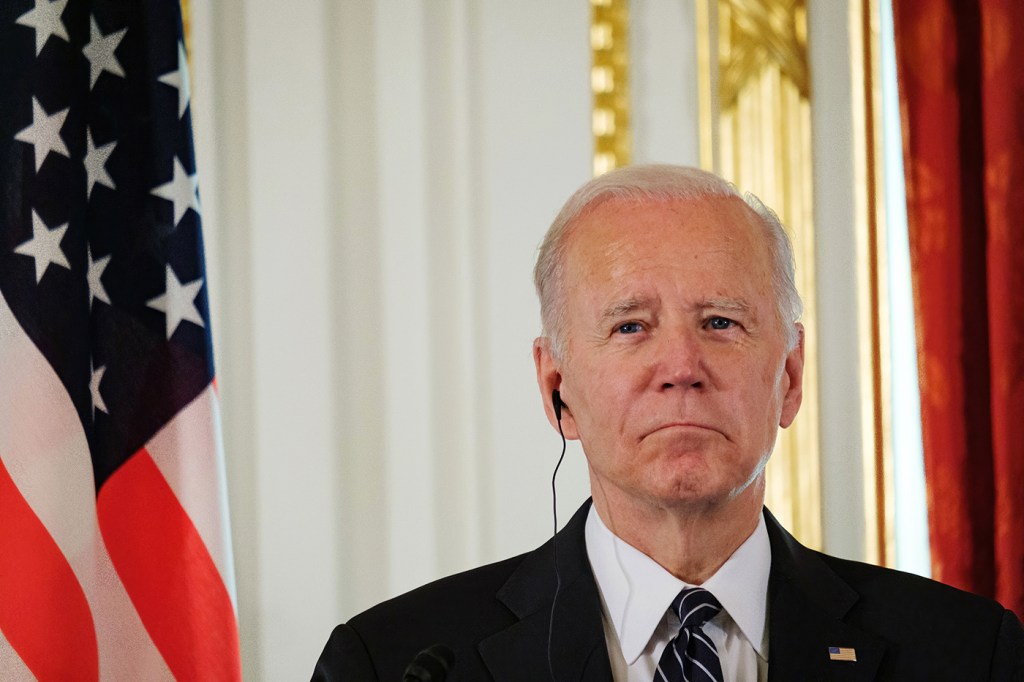Biden vowed to protect Taiwan. What does that mean?

A flurry of geopolitical moves have followed President Joe Biden’s May 23 vow of increased support for Taiwan. The American declaration is heightening tensions between the U.S. and mainland China, says Xuechen Chen, a professor of politics and international relations for NCH at Northeastern in London.
China, which views Taiwan as a breakaway province, sent 30 warplanes into the Taiwanese air defense zone on Monday. The incursion happened while Sen. Tammy Duckworth of Illinois was in Taipei on an unannounced visit.

On Wednesday, Biden revealed plans for a new trade pact with Taiwan that will parallel the proposed U.S. partnership with a dozen Indo-Pacific nations that Biden announced on a recent trip to Asia.
The U.S. initially appeared to be amending its longstanding strategy of “strategic ambiguity” that had helped deter China from a hostile takeover of Taiwan without committing to American military action. Biden upped the rhetoric in Tokyo on May 23 when he promised a stronger response to a potential Chinese invasion of Taiwan than the U.S. showed when Russia attacked Ukraine. The U.S. has since walked back Biden’s comments, insisting that its policy has not changed.
This is the third time that Biden has vowed a U.S. response to a potential strike on Taiwan, notes Chen.
“I don’t think that Biden’s comments will fundamentally result in a formal shift in U.S. policy,” Chen says. “But I do think these comments in the longer term might contribute to a policy drift that risks creating further conflicts and might result in a higher level of tension.”
Chen spoke with News@Northeastern about U.S.-China relations, as well as an American-led proposal to increase trade with Asian countries. Her comments have been edited for brevity and clarity.
Why do Biden’s comments matter?
The U.S. for many decades has adopted the position of strategic ambiguity towards Taiwan. The intention was to deter mainland China from invading Taiwan militarily, but also to deter Taiwan from seeking to be fully independent.
My personal fear is that these comments will unnecessarily cause tension.
It appears that China wants to—at least for the short term—maintain the status quo. But as we can learn from what is happening in Ukraine, we never know when and where the red line can be crossed.
Is China learning lessons from Russia’s ill-fated invasion of Ukraine?
I personally think that the current chaotic situation in Ukraine might make Beijing more cautious.
I have a very pessimistic view of whether China can maintain its economic growth and development, based on the latest statistics. And then there is the evidence of what has happened to the economy in Russia as a result of its war in Ukraine. The result would be very difficult for China.
Let’s say China tries to take over Taiwan—what comes next? A huge issue for Russia is the next step. How can Russia manage the situation in Ukraine, given that Russia is now receiving so much pressure politically and economically from the West? I think those types of consequences are something that China can’t afford at this stage.
What happens if the next U.S. president refuses to affirm Biden’s strong language to deter China—if so, might Beijing view a more relaxed approach by a future president as an invitation to invade?
That is another problem. Biden has tried extremely hard to restore the trust and rebuild U.S. relationships with its allies in the region.
But whether the U.S. can maintain a good level of continuity in its foreign policy is something that many Asian partners are worried about. And it will all depend on the next U.S. administration.
During his trip, Biden announced an economic alliance with a dozen Indo-Pacific countries. China responded by accusing him of forcing the countries to choose between the U.S. and China. What are the essentials of the new pact?
There is not much substance to it. It’s too vague to be implemented at this stage, and that’s why many of the countries are skeptical about whether the Indo-Pacific economic framework can be substantially implemented.
The pillars that Biden has emphasized are supply chain resilience, clean energy, anti-corruption, and lifting the standards of labor rights. But in Southeast Asia especially, many countries don’t want high labor standards to be incorporated in the trade negotiations. Many Asian countries prefer to trade with China because China doesn’t attach high labor standards or political conditionalities to trade.
What has been lacking in these proposals is: How can Asian countries get better access to the U.S. market? But Biden wants to protect U.S. workers, which is why I don’t see him being willing to reduce tariffs and open up the U.S. market.
If the proposal doesn’t offer sufficient incentives to Asian countries, then how can it be sufficiently attractive to engage them?
To what extent will Europe compete with the U.S. in Asia?
It will be interesting to see how transatlantic relations between the U.S. and the European Union play out in this area. Will they be more convergent? Because both the EU and U.S. propose this idea of free, open, and fair trade in the Indo-Pacific region.
The EU claims that it is seeking strategic autonomy, which means that it doesn’t want to rely too much on the U.S. So will that vision generate more cooperation and collaboration in the region? Or will it mean that the U.S. and EU will become competitors?
For media inquiries, please contact media@northeastern.edu.






